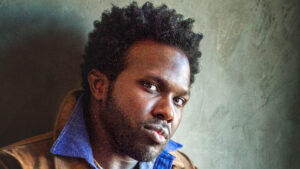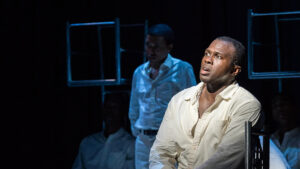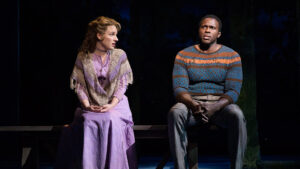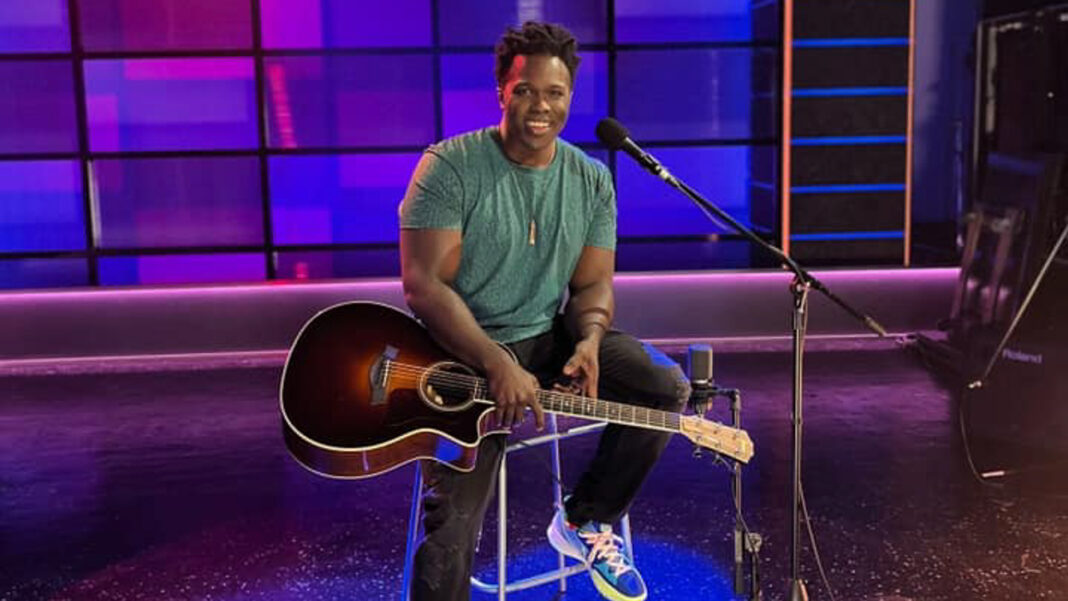This Saturday The Soraya in Northridge, California is going celebrate Broadway at the Soraya as part of their tenth anniversary. They’ve brought together three Broadway stars for the show: Eden Espinosa (Brooklyn, Wicked), Megan Hilty (9 to 5 and Noises Off!) and three-time Tony Award nominee Joshua Henry.

Henry received nominations for his performances in The Scottsboro Boys, Violet and the 2018 revival of Carousel. He’s an original cast member of In the Heights and has toured in Hamilton. Some of his other Broadway credits include The Gershwins’ Porgy and Bess and Shuffle Along, Or the Making of the Musical Sensation of 1921 and All That Followed. Most recently he became the first Black actor to play the role of Dr. Pomatter in Waitress.
I took this occasion to talk to Henry, who was just announced along with Adrienne Warren as the Broadway stars to announce this year’s Tony nominations, about his first-ever stage role, to look back on his career so far and to also look forward to where and what Broadway might and should become. What follows are excerpts from our conversation that have been edited for length and clarity.
There’s so much more to hear from Henry, so I strongly encourage you to watch the full interview on our YouTube channel for stories about Carousel, tick…tick…Boom!, Stephen Sondheim and more.
I want to start by asking you about something that Harold Hill says in The Music Man, the first role you ever played which was at Florida Bible Christian School. He says “A man can’t turn tail and run just because a little personal risk is involved.” It strikes me as though that is the journey every actor takes to try to get on Broadway. What are the kind of risks that you feel you’ve taken that have been most successful for you in getting this career that you have now?
I love that quote. I would say one of the biggest risks that I took was when I was doing In the Heights and it was my first Broadway show and Lin-Manuel [Miranda’s] first Broadway show. We had just won the Tony Award for Best Musical. I was in the ensemble and I had the opportunity to go to a principal role on Broadway in Godspell and play Judas. [In the Heights] was going to run for a long time. But I was like, Oh, I definitely see myself as a principal.
So I decided to put in my four weeks notice, leave and go do Godspell. And this was in 2008. Long story short, the show lost its investment and it didn’t happen. So I find myself in between these two amazing things, just right in the middle of a valley. That’s one of the biggest risks I took. I’m so glad that I took it early on because it showed me the highs and lows of the business and how I need to find something to sustain myself beyond the highs and lows.
When you think of Broadway as it was back when you were doing In the Heights and Broadway as it is today, pandemic aside if that’s possible, what do you miss most from the way it was and what do you like most about what it is now?
That’s a good question. I’ll start with what I love about what it is now. I think we’re just much more aware of bringing lots of voices to the table creatively and management wise and producing wise. For instance, Black folks are much more in control of their narrative and the way that they run their shows. I think that’s really important.
What do I miss about what was pre-pandemic or even 2008? For me, it was just this incredible community. It’s still an incredible community, but what struck me when I just got here was how it was just fun. It was just absolute fun. I came from Miami, Florida and coming up to New York in 2006 it was just this world of wonder. And I think now it’s not just fun for me anymore. It’s trying to do the right thing. It’s also fun, but now I’m much more aware and I’m much more strategic in how I’m trying to amplify different voices.
Last year I saw the revival of Caroline, Or Change, a show I loved when it was first on Broadway. But it felt like time and audiences had caught up with it in a way they didn’t the first time around. If The Scottsboro Boys was given a revival today do you think this awareness you mentioned might breathe new life into the show?

100 percent correct! Caroline, Or Change is a great example, it depends on the moment. The audiences in 2010 didn’t want to hear about this true story. I bet you now if Scottsboro Boys is on Broadway right now, oh my goodness! Art sometimes lines up with what’s going on. I’m so sad that I missed Caroline, Or Change because I heard it was incredible. Scottsboro Boys went to the West End and won some Oliviers there. It’s had a great regional life since I did it again at the Ahmanson Theater. It all depends on the moment and I do believe that if Scottsboro Boys came back right now that it would do really well.
You’re on Billy Porter‘s album The Soul of Richard Rodgers, which is completely a pop approach. I’m wondering how important you think it is for projects like that to exist so that people don’t think that Rodgers and Hammerstein or moving forward, even someone like Stephen Sondheim, is part of a previous generation or generations past, and that there’s still something viable about what these songs have to say and that young audiences should be paying attention to them.
The great thing about Stephen Sondheim music, Richard Rodgers music, is it’s just phenomenal storytelling, phenomenal lyric, incredible melodic lines. As someone who grew up in the 90s listening the R&B, pop, rock, jazz, I’m going to see great material through my lens and I’m going to want to interpret it like that, just like Billy Porter or Michael McElroy would want to in their lenses. And I think incredible material that speaks to us will stand the test of time and genre interpretation.
I’m glad to be part of a school of thought that wants to bring those incredible composers as current as possible just to people that don’t know and just think that that’s way back. And I hope that a lot of institutions now understand that and we can rethink some of these classics. They’re fine on their own. But what we’re talking about is bringing them to a newer audience and that’s going to take a little more fine tuning.
Do you remember your first audition for a Broadway show and the song you sang? What was it and what do you think your perspective would be on both how you think you performed it then and how you might perform it now?

Oh gosh, my first Broadway show was off-Broadway at the time, but it was In the Heights. I sang the song “Hear Me Out.” That was a song that Benny sang to Nina’s dad to be like, “Hey, listen. I can handle some more responsibility and I can handle your daughter. Just trust me.” It didn’t make it to Broadway, but that song it’s very hip hop and R&B.
It’s funny that the the title “Hear Me Out” means so much more to me now. I have a hat I was just wearing and it says, “Be Heard.” So like, hear me out, you know? Now I think about it in terms of Broadway. I want to be heard in a different way now. I want more voices to be heard.
If I’m going to sing that song now, though, oh gosh. You know what, Craig? I think I’m going to cover that. I’m going to cover that song. I’m going to put it on Tik Tok because I haven’t thought about it in a little while and I’m going to text Lin. I’m going to be like, “Yo, check this out.” I’m so glad that you brought that up.
To watch our full interview with Joshua Henry, please go here.
Photo: Joshua Henry (Courtesy his Facebook Page)











